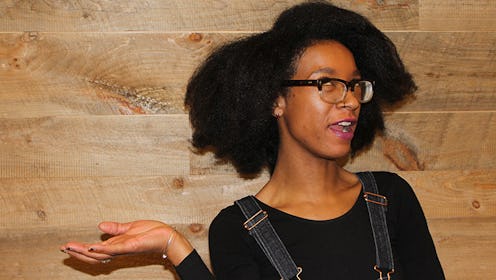
If the word "natural" is showcased in bold letters on that bottle of leave-in conditioner, few of us bother to scan the ingredient list for any suspicious looking characters. Even though I'm not the most trusting consumer, I often find it hard to believe that so many companies are legally allowed to abuse and destroy the word "natural." What can even be more confusing are the many types of vegetable oils on the market that come in a variety of forms, some of them incredibly beneficial and some known to lead to scaly skin. Fortunately, it just takes a little digging to find out why some ingredients usually dubbed harmful can actually be a beauty life-saver when used correctly. Personally, I'm pretty content with the recent addition of vegetable glycerin for my hair and skin products.
Vegetable glycerin is a natural humectant, which is something my entire bod craves all year round. When used with other natural oils and ingredients, it can seal in moisture on the top layer of our skin while the other oils work their way deep into our cells to provide long-lasting moisture. You do have to be careful when seeking out glycerin: There are non-vegetable varieties, derived from petroleum or animal fat, that can be seriously drying.
Pure vegetable glycerin is derived from plant seed oils like palm, coconut, or soy. According to the Global Healing Center, vegetable glycerin is often used in beauty because it's easily absorbed into the skin, making active ingredients in product easier for the skin to absorb as well. Vegetable glycerin isn't an additive that has no value (like some other sugars); it actually helps your body attract moisture and sop up healthy ingredients. That's why I love adding it to my DIY beauty recipes.
Real vegetable glycerin needs to be stored properly because it's derived from plants without preservatives. Avoid propylene or petroleum based glycerin — these nasty ingredients are often added to preserve the shelf-life of vegetable glycerin, but they're not worth the extended expiration date. Look for brands that say USP grade, non-GMO, and kosher certified. The oil should be clear, odorless, and have a syrupy consistency very similar to castor oil. My personal favorite is Aura Cacia's vegetable glycerin which is affordable and totally legit.
Now that you've found the glycerin of your dreams, here are some at-home beauty recipes to make with it.
Coconut & Aloe Leave In Leave-In Conditioner
Obviously if vegetable glycerin brings moisture to the skin on our face, it can do the same for the skin on our scalp. I recommend using it with other oils, because undiluted vegetable glycerin in can actually strip moisture and cause hair breakage. However, the plenty of natural hair bloggers note that studies have found vegetable glycerin to protect hair breakage, particularly during combing, on natural hair. That's something I definitely can't ignore and it's exactly why I've made this leave-in conditioner that attracts and protects moisture. Here's how it goes!
- 1 cup of coconut oil
- 1/8 of aloe vera leaf extract
- 2 tablespoons of sunflower seed oil
- 2 tablespoons of vegetable glycerin
- 1 teaspoon of castor oil (optional)
- 8 drops of lavender essential oil
- 4 drops of sage essential oil
Mix up your ingredients in a blender and store your conditioner in a sealable dark container to preserve for future use. I suggest using your leave-in conditioner on wet hair and style accordingly; vegetable glycerin's effects are best seen when used in a leave-in conditioner as opposed to a deep conditioner that you would rinse out.
Green Tea & Honey Face Cleanser
Two reasons why this cleanser is one of my favorite recipes: 1. It leaves my skin feeling hydrated and soft and 2. It doesn't leave a complete mess in my sink. I used four tablespoons of raw honey, half a cup of freshly brewed green tea, two tablespoons of vegetable glycerin, and then I added patchouli, geranium, and lemon essential oils. I used a blender to mix my ingredients and then stored in a sealable, tinted container. This cleanser smells and feels amazing!
Image: Earthworm/Flickr; Giphy; Kristin Collins Jackson